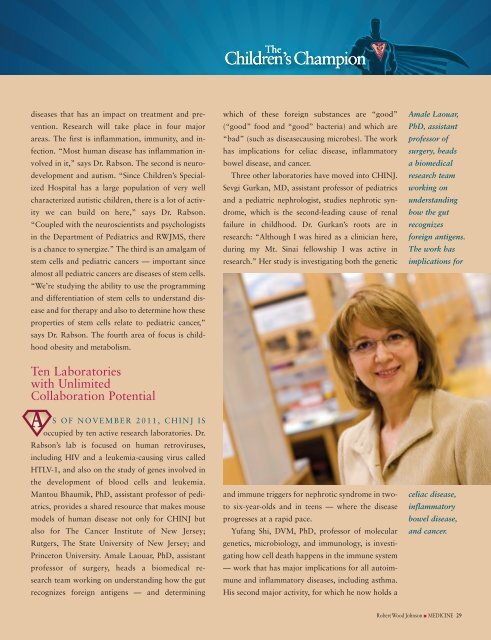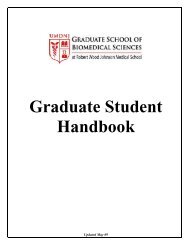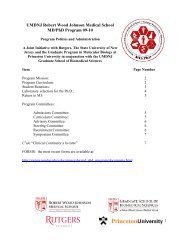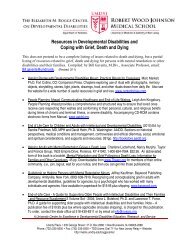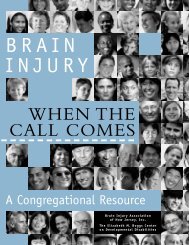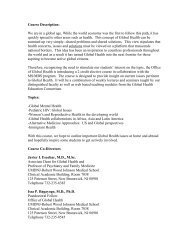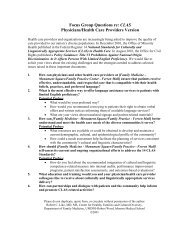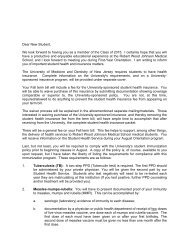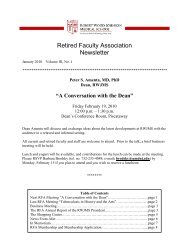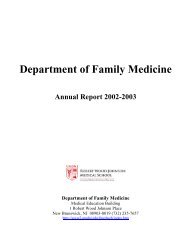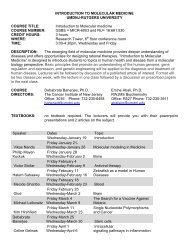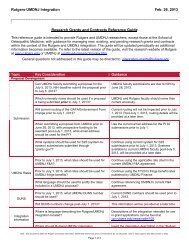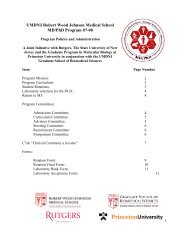S - Robert Wood Johnson Medical School - Rutgers, The State ...
S - Robert Wood Johnson Medical School - Rutgers, The State ...
S - Robert Wood Johnson Medical School - Rutgers, The State ...
Create successful ePaper yourself
Turn your PDF publications into a flip-book with our unique Google optimized e-Paper software.
<strong>The</strong>Children’sChampiondiseases that has an impact on treatment and prevention.Research will take place in four majorareas. <strong>The</strong> first is inflammation, immunity, and infection.“Most human disease has inflammation involvedin it,” says Dr. Rabson. <strong>The</strong> second is neurodevelopmentand autism. “Since Children’s SpecializedHospital has a large population of very wellcharacterized autistic children, there is a lot of activitywe can build on here,” says Dr. Rabson.“Coupled with the neuroscientists and psychologistsin the Department of Pediatrics and RWJMS, thereis a chance to synergize.” <strong>The</strong> third is an amalgam ofstem cells and pediatric cancers — important sincealmost all pediatric cancers are diseases of stem cells.“We’re studying the ability to use the programmingand differentiation of stem cells to understand diseaseand for therapy and also to determine how theseproperties of stem cells relate to pediatric cancer,”says Dr. Rabson. <strong>The</strong> fourth area of focus is childhoodobesity and metabolism.Ten Laboratorieswith UnlimitedCollaboration PotentialAS O F N O V E M B E R 2 0 1 1 , C H I N J I Soccupied by ten active research laboratories. Dr.Rabson’s lab is focused on human retroviruses,including HIV and a leukemia-causing virus calledHTLV-1, and also on the study of genes involved inthe development of blood cells and leukemia.Mantou Bhaumik, PhD, assistant professor of pediatrics,provides a shared resource that makes mousemodels of human disease not only for CHINJ butalso for <strong>The</strong> Cancer Institute of New Jersey;<strong>Rutgers</strong>, <strong>The</strong> <strong>State</strong> University of New Jersey; andPrinceton University. Amale Laouar, PhD, assistantprofessor of surgery, heads a biomedical researchteam working on understanding how the gutrecognizes foreign antigens — and determiningwhich of these foreign substances are “good”(“good” food and “good” bacteria) and which are“bad” (such as diseasecausing microbes). <strong>The</strong> workhas implications for celiac disease, inflammatorybowel disease, and cancer.Three other laboratories have moved into CHINJ.Sevgi Gurkan, MD, assistant professor of pediatricsand a pediatric nephrologist, studies nephrotic syndrome,which is the second-leading cause of renalfailure in childhood. Dr. Gurkan’s roots are inresearch: “Although I was hired as a clinician here,during my Mt. Sinai fellowship I was active inresearch.” Her study is investigating both the geneticand immune triggers for nephrotic syndrome in twotosix-year-olds and in teens — where the diseaseprogresses at a rapid pace.Yufang Shi, DVM, PhD, professor of moleculargenetics, microbiology, and immunology, is investigatinghow cell death happens in the immune system— work that has major implications for all autoimmuneand inflammatory diseases, including asthma.His second major activity, for which he now holds aAmale Laouar,PhD, assistantprofessor ofsurgery, headsa biomedicalresearch teamworking onunderstandinghow the gutrecognizesforeign antigens.<strong>The</strong> work hasimplications forceliac disease,inflammatorybowel disease,and cancer.<strong>Robert</strong> <strong>Wood</strong> <strong>Johnson</strong> ■ MEDICINE 29


